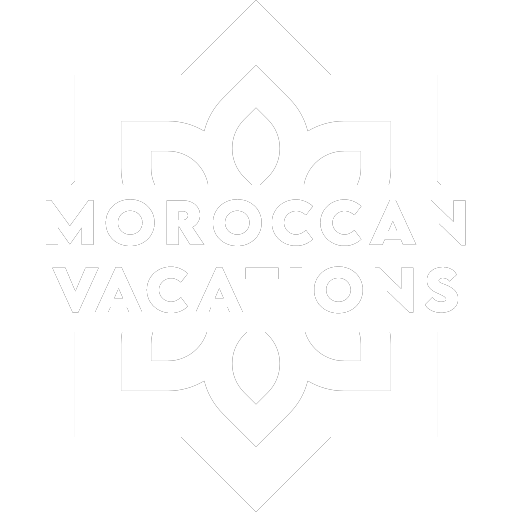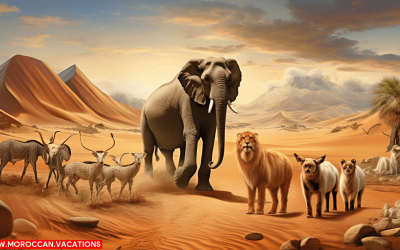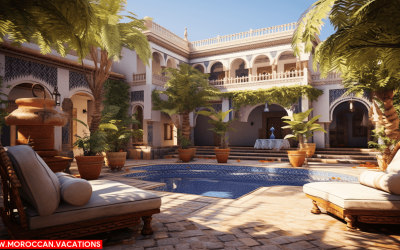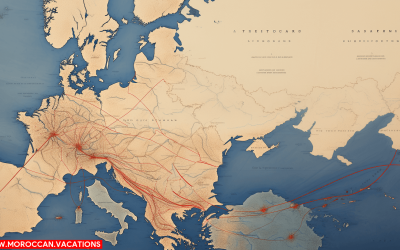Religion in Morocco
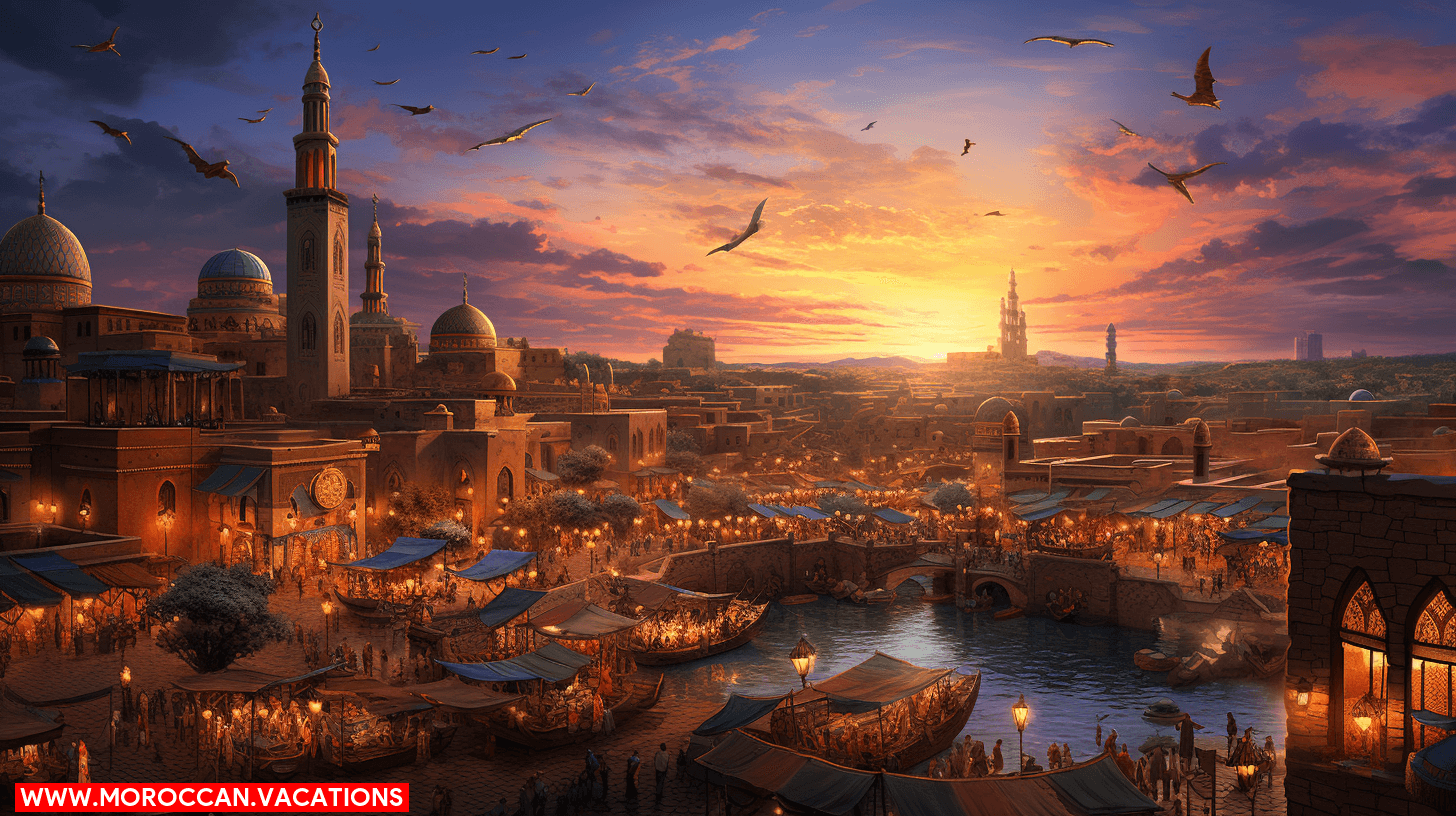

You’re voyaging through the tapestry of cultural heritage when you arrive at the heart of Morocco’s spiritual life: Islam. As you explore, you’ll find that the majority of Moroccans practice Sunni Islam, the country’s lifeblood, which pulses through daily routines and grand mosques alike. While Islam dominates, you’re free to encounter a mosaic of beliefs, as the constitution guarantees freedom of worship. Christianity and Judaism, though minority faiths, have historical roots here, contributing to the country’s rich religious landscape. As you tread through bustling medinas or quiet mountain villages, you’ll notice the echoes of centuries-old religious traditions shaping the contours of modern Moroccan society. Your pursuit of understanding may lead you to sacred sites, revealing the layers of devotion that Morocco cherishes.
You’ll find that Islam is not only the majority religion in Morocco but also the state religion, shaping the cultural and political landscape. While the Moroccan constitution guarantees religious freedom, the reality on the ground reflects a complex interplay between law and daily life. It’s important to consider how Morocco’s stance on religious freedom aligns with international standards and affects both its citizens and global relations.
Islamic Influence
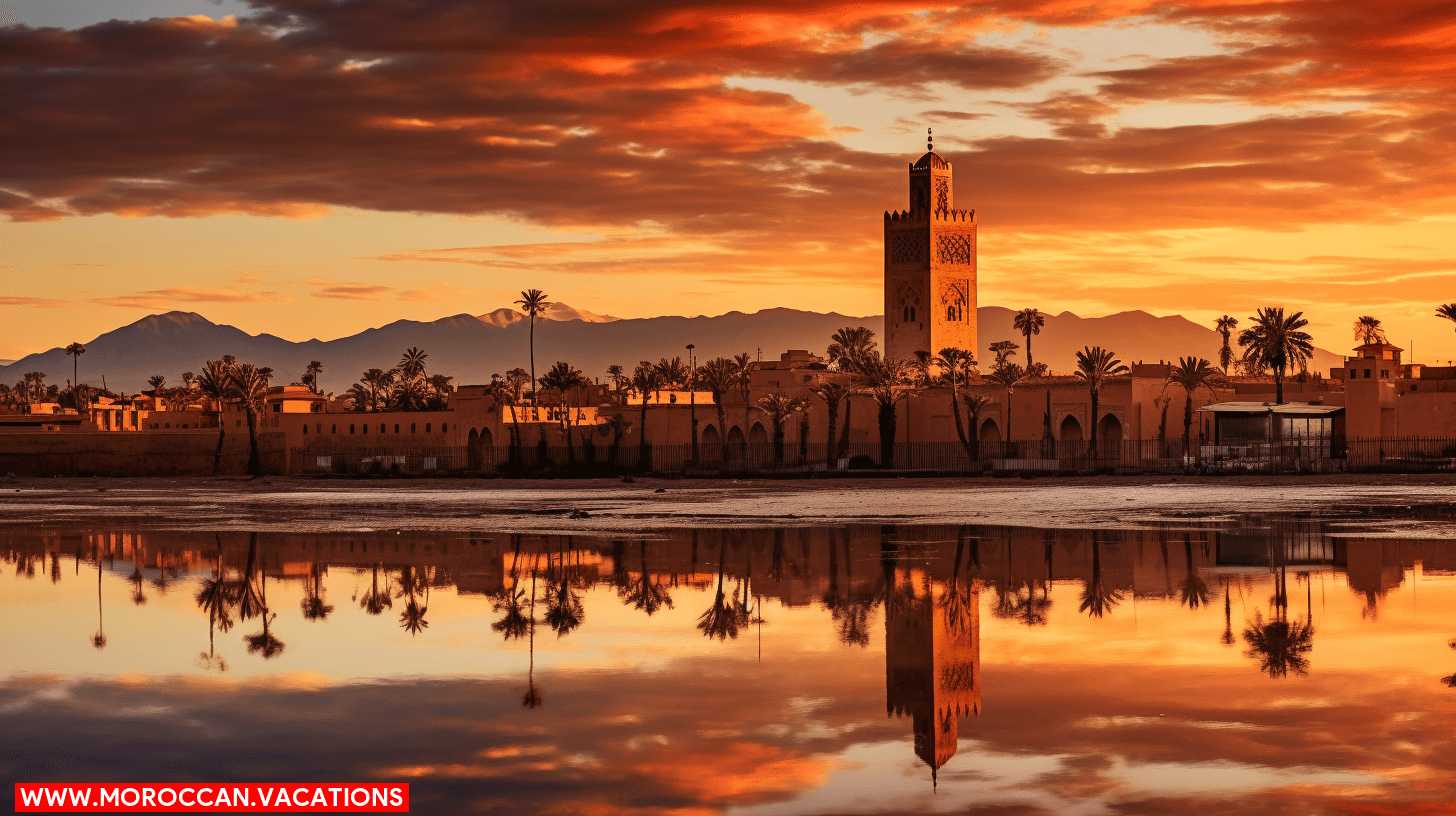

As you explore Morocco’s religious landscape, you’ll find that Islam is not only the majority religion but also a significant cultural force shaping the nation. The predominant branch, Sunni Islam, is practiced by the vast majority of Moroccan Muslims, while Shia Muslims constitute a smaller community. This religious demography has profound implications on Morocco’s social norms, legal frameworks, and political structures.
Islamic Religion in Morocco
You’ll find that Islam is the predominant religion in Morocco, deeply ingrained in the country’s cultural and social fabric. Its influence weaves through daily life and is evident in various aspects:
- Islamic Attire
- Traditional dress such as djellabas signifies modesty
- Hijabs and caftans are common among women
- Educational and Spiritual Structures
- Quranic schools are widespread, teaching Islamic principles
- Sufi brotherhoods play a significant role in spiritual life
- Religious Practices and Celebrations
- Ramadan observances dictate the rhythm of daily life for a month
- Muslim holidays, like Eid al-Fitr and Eid al-Adha, are celebrated with fervor
Morocco’s Islamic traditions offer a tapestry of devotion and community that is both visible and vibrant.
Sunni Muslims in Morocco
Within Morocco’s Islamic community, the majority of adherents are Sunni Muslims, shaping the nation’s religious landscape with their practices and beliefs. Sunni practices, including the five daily prayers and the celebration of Muslim festivals like Eid al-Fitr and Eid al-Adha, are integral to Moroccan life. Religious demographics highlight a strong Sunni majority, with a notable Sufi influence that contributes to the country’s rich spiritual tapestry. This Sufi presence fosters a more mystical interpretation of Islam, complementing the mainstream Sunni tradition.
In recent years, Morocco has emphasized interfaith dialogue, advocating for understanding and peace among different religious communities. This commitment reflects a progressive stance, respecting individual freedoms while cherishing the collective heritage. Your engagement with Moroccan culture may reveal the depth of its Islamic identity, harmoniously intertwined with a history of diversity and tolerance.
Shia Muslims in Morocco
Explore the minority Shia Muslim community in Morocco, which, despite its smaller size compared to the Sunni majority, adds another layer to the nation’s Islamic mosaic.
- Shia Demographics
- Smaller concentrations in cities
- Historical sects with local roots
- Distinct from the Sunni majority but integral to the societal fabric
- Cultural Rituals
- Observance of Ashura with unique customs
- Preservation of Shia heritage through commemorations
- Contribution to Morocco’s diverse religious practices
- Minority Representation
- Striving for recognition in a predominantly Sunni landscape
- Engaging in interfaith dialogue to promote understanding
- Efforts to maintain religious freedoms and cultural identity
Shias in Morocco navigate their identity with a sense of solidarity, upholding their traditions while contributing to the broader dialogue on faith and freedom.
Freedom of Religion
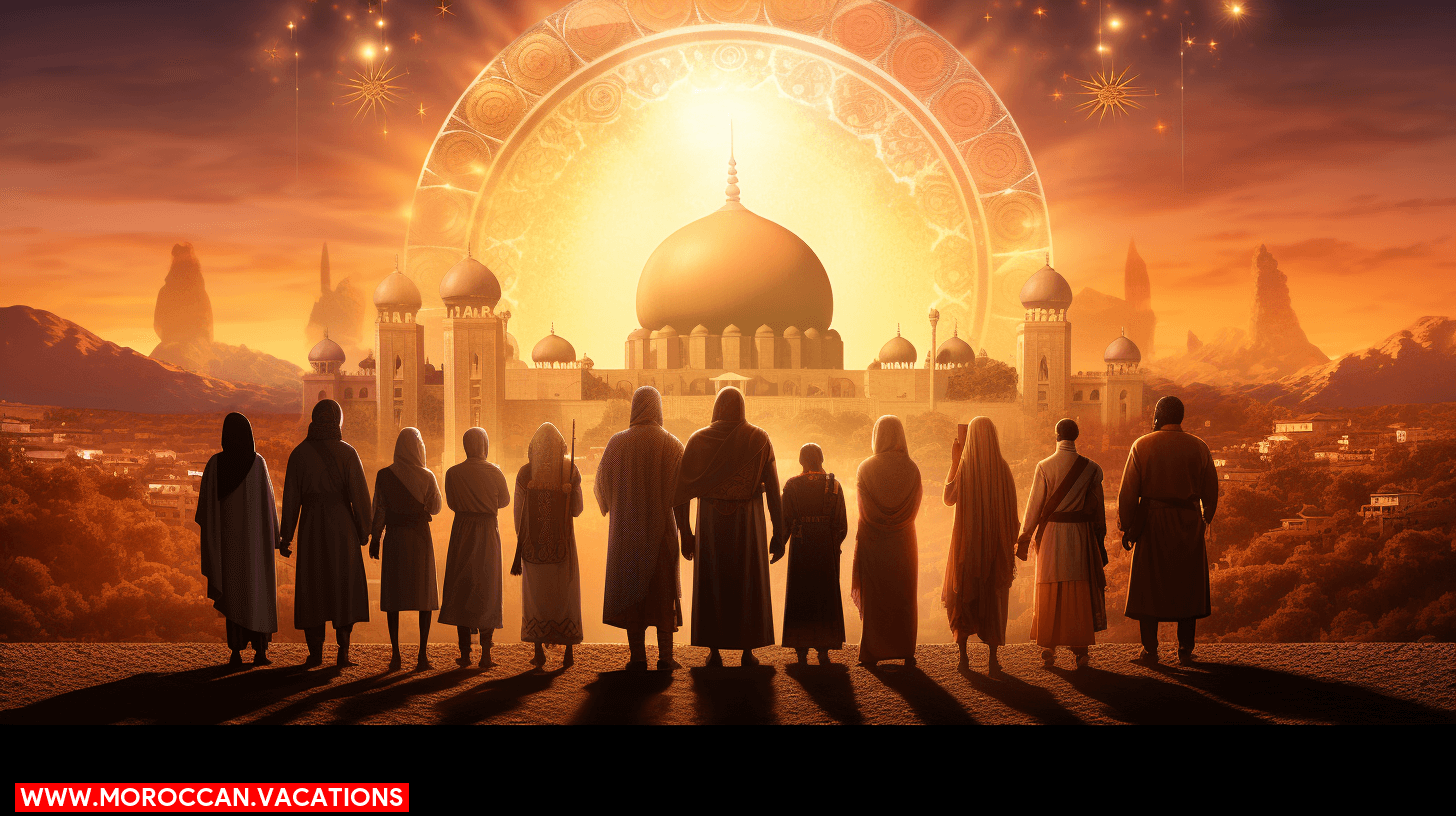

As you explore the religious landscape of Morocco, you’ll find that while Islam is the state religion, the Moroccan constitution grants individuals the freedom to practice their faith. This has given rise to a Christian community that, although small, actively participates in religious life within the country. However, the distribution of non-Islamic religious materials is a nuanced issue, reflecting the balance between constitutional rights and societal norms.
Practice of Religion in Morocco
In Morocco, you’ll find that despite Islam being the state religion, the constitution guarantees freedom of religion to all its citizens. This freedom allows for a rich tapestry of:
- Cultural rituals
- Traditional Islamic celebrations
- Berber spirituality woven into local customs
- Commemoration of saints and local festivals
- Sufi practices
- Brotherhood gatherings
- Spiritual music and poetry nights
- Circles of Dhikr (remembrance of God)
- Interfaith dialogue
- Platforms for religious understanding
- Events celebrating religious holidays from multiple faiths
- Collaborative community service projects
Such diversity contributes to a society where you’re encouraged to explore and express your beliefs, respecting the mosaic of traditions that coexist. Morocco’s approach to religious practice exemplifies a commitment to both its heritage and the ideals of freedom.
Christian Community in Morocco
Within Morocco’s landscape of religious freedom, you’ll find a Christian minority practicing their faith alongside their Muslim neighbors. Understanding Christian demographics reveals a small but significant presence, with expatriates and converts comprising this diverse group. Interfaith dialogue, particularly in urban areas, fosters mutual respect and peaceful coexistence, reflecting Morocco’s historical tolerance.
The church history in Morocco, although overshadowed by Islam’s dominance, is rich and dates back to early Christianity. Today, churches cater to the Christian community, celebrating Christian holidays openly, albeit on a much smaller scale compared to Islamic festivals. Missionary work, while sensitive, occurs under certain restrictions, aiming to support local communities without proselytizing. As you explore Morocco’s religious tapestry, it’s clear that freedom and respect are key to the enduring cohabitation of different faiths.
Distribution of Non-Islamic Religious Materials
You’ll find that Morocco’s constitution guarantees religious freedom, allowing for the distribution of non-Islamic materials, albeit with certain limitations. This reflects a balance between cultural sensitivity and the desire for religious expression. Here’s how this plays out:
- Censorship Concerns
- Authorities monitor religious materials to prevent what’s considered incitement.
- Some literature, particularly deemed offensive or proselytizing, might be restricted.
- The definition of what constitutes “religious contraband” can be ambiguous.
- Interfaith Dialogues
- Encouraged to promote understanding among majority and minority religions.
- Channels for discourse exist, though they’re often under governmental oversight.
- Cultural Sensitivity
- Minority religions can celebrate and share their faiths, respecting the Islamic context of the nation.
- Public evangelizing is discouraged to maintain societal harmony.
Religious Sites in Morocco
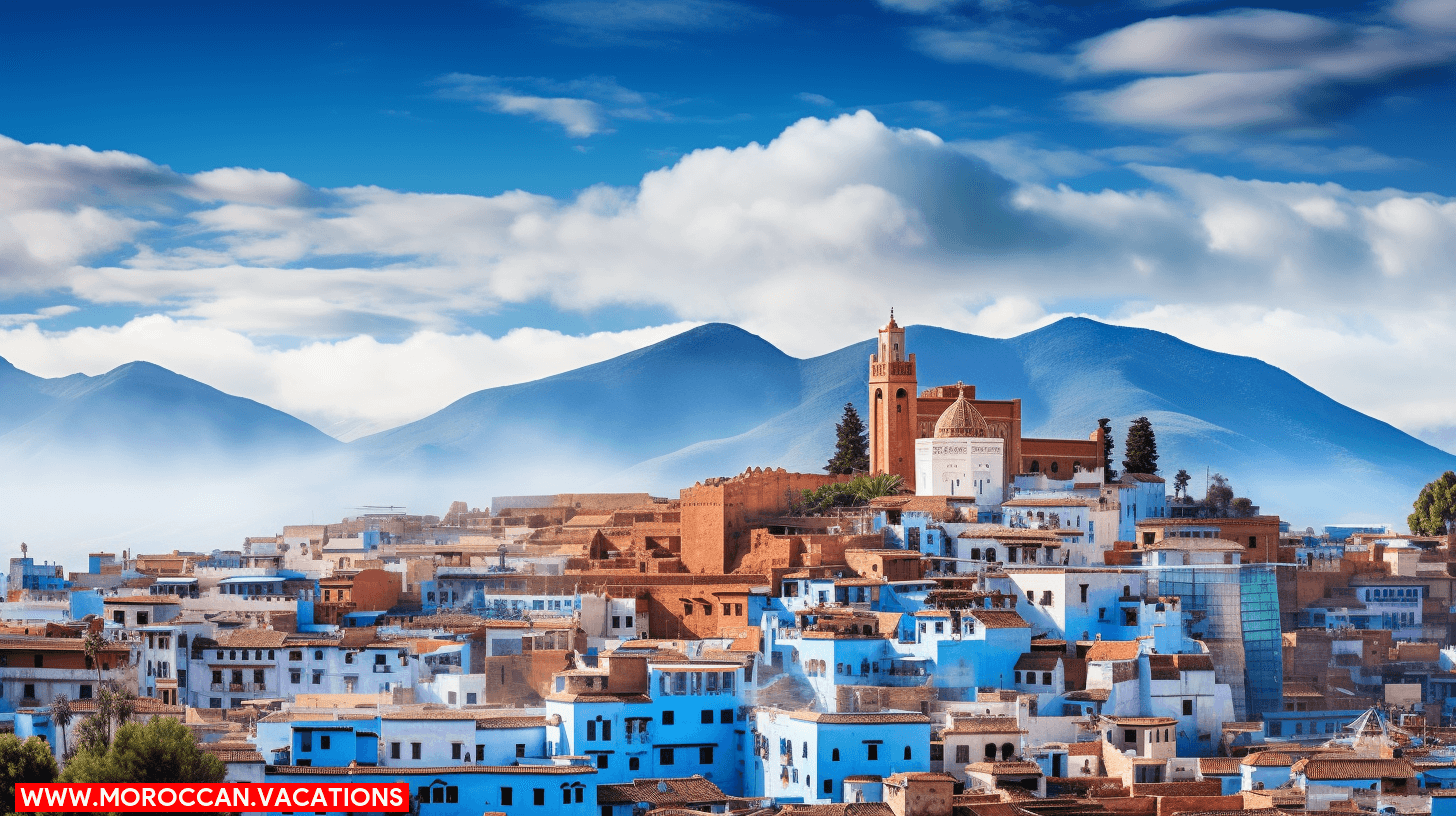

As you explore Morocco’s spiritual landscape, you’ll encounter an array of religious sites that reflect the nation’s Islamic majority and its historical religious diversity. Mosques, such as the iconic Koutoubia in Marrakech, stand as both places of worship and architectural marvels, while Christian churches and Jewish synagogues, like the Beth-El Synagogue in Casablanca, serve smaller yet significant communities. These sites offer a window into the complex tapestry of Moroccan faith and culture, inviting respectful observation and understanding.
Mosques and Islamic Institutions
Morocco’s landscape is dotted with numerous mosques and Islamic institutions that serve as both places of worship and cultural heritage sites. You’ll find that:
- Islamic architecture
- Ornate minarets piercing the skyline
- Intricate tile work, a hallmark of Moroccan design
- Historic madrasas with richly carved woodwork
Prayer rituals are a cornerstone of daily life, and religious education is deeply rooted in society, with traditional and modern institutions fostering spiritual understanding. Spiritual tourism thrives as visitors flock to experience the serene beauty of Sufi practices and the hospitality of the Moroccan people. These institutions aren’t just places for devotion; they’re also vibrant community centers where the heart of Morocco’s Islamic tradition beats strongly.
Christian Sites
Moving beyond the Islamic heritage, you’ll also encounter Christian churches and chapels that reflect Morocco’s historical religious diversity. These sites offer a unique perspective into the Christian minorities that have contributed to the country’s rich tapestry of faiths. Whether you’re interested in Christian pilgrimages, Cathedral visits, or simply exploring Biblical history, Morocco provides a rare opportunity for cross-cultural worship and understanding.
Here’s a quick overview of Christian sites you might consider:
| Site Type | Location | Significance |
| Cathedral | Casablanca | Modern religious architecture |
| Chapel | Tangier | Intimate worship and community space |
| Historical Church | Fez | Deep-rooted Biblical history |
| Pilgrimage Site | Marrakech | Destination for Christian pilgrimages |
These locations are not just tourist attractions but are active places of worship and community hubs for Christians in Morocco.
Synagogues and Jewish Sites
In addition to Islamic and Christian places of worship, you’ll find that Morocco’s Jewish heritage is well-represented by a number of synagogues and historical Jewish sites across the country. These locations are not only places of prayer but also serve as cultural touchstones for the Jewish diaspora and those interested in Sephardic heritage.
- Synagogues and Jewish Sites:
- *Beth-El Synagogue* in Casablanca: a hub for Hebrew classes and religious services.
- *Mellah* neighborhoods: former Jewish quarters, especially in cities like Fez and Marrakech.
- *Jewish cemeteries*: with tombstones inscribed in Hebrew, reflecting centuries of history.
During Passover celebrations, these sites become focal points for gatherings, and throughout the year, nearby Kosher restaurants offer a taste of Jewish culinary traditions to locals and visitors alike.
Constitutional Stance on Religion
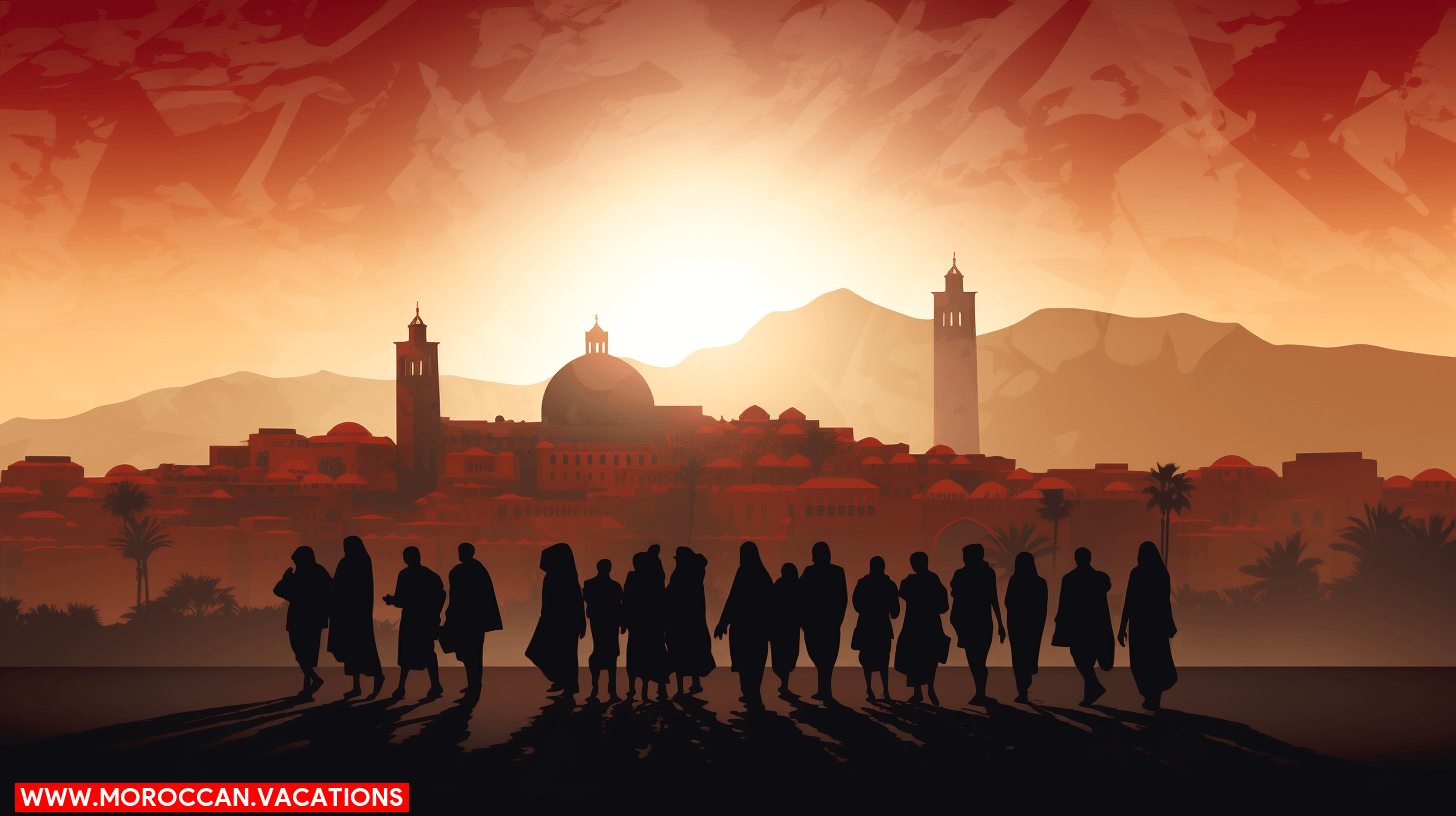

You’ll find that Morocco’s Constitution enshrines Islam as the state religion while also asserting itself as a guarantor of freedom of worship. This balance reflects the country’s commitment to protecting religious rights, a crucial aspect of its governance. It’s essential to understand how these principles translate into everyday life and the legal system in Morocco.
Morocco’s Constitution and Religion
As you delve into Morocco’s constitutional framework, you’ll find that it enshrines Islam as the state religion. However, the nation is a constitutional monarchy that balances royal authority with secular legislation and legal pluralism, reflecting a diverse society where Amazigh spirituality also has roots.
- Morocco’s Constitutional Monarchy
- The King holds significant power but is also a “Commander of the Faithful,” implying a religious role.
- Legislation often harmonizes Islamic principles with modern governance needs.
- Secular Legislation
- Laws are crafted to meet international standards while respecting Islamic tenets.
- Legal pluralism allows for a variety of legal interpretations and applications.
- Respect for Diversity
- The constitution acknowledges the Hebrew and Amazigh components of national identity.
- Amazigh spirituality is recognized alongside Islam, albeit without the same official status.
Freedom of Religion Guarantor
The Moroccan Constitution guarantees your freedom of worship, reflecting the nation’s commitment to religious plurality within the framework of its Islamic identity. While Islam is the state religion, the rights of religious minorities are recognized and protected. The presence of secular movements, albeit limited, points to a society that’s grappling with contemporary notions of faith and state.
Interfaith dialogue is encouraged, fostering a cultural identity that’s both rich and diverse. This openness contributes positively to international perceptions of Morocco as a country that honors the mosaic of its inhabitants’ beliefs. However, the true extent of religious freedom is often measured by the lived experiences of these minorities and secular advocates, whose liberties are the touchstone of the constitution’s promises.
Protecting Religious Rights in Morocco
In Morocco, your religious rights are enshrined in the constitution, ensuring the practice of faith beyond Islam is respected and safeguarded. The nation strives for cultural tolerance and the legal framework reflects this commitment:
- Cultural tolerance
- Promotes societal attitudes embracing diversity
- Encourages interfaith dialogue for mutual understanding
- Interfaith dialogue
- Facilitated by various institutions
- A platform for religions to coexist peacefully
- Minority protections
- Specific legal measures protect non-Muslim communities
- Representation in government bodies
These elements coalesce to form a society where you’re encouraged to freely express your beliefs. Morocco’s approach to protecting religious rights illustrates a balanced interplay between maintaining a dominant faith and acknowledging the mosaic of other religious identities.
Introducing Ayoub Karbachi, a brilliant wordsmith and curator of the Moroccan Vacations website. Prepare to immerse yourself in mesmerizing narratives and extraordinary moments, as he unveils the allure of Morocco's captivating destinations like never before.
Related Articles
What Animals Live in the Sahara Desert
Types of Animals Found in the Sahara Desert Photo by: @https://owlcation.com/stem/sahara-desert-animals Imagine yourself tracking the majestic dromedary camel across the vast, sandy dunes of the Sahara Desert. As you embrace the spirit of adventure, you're not alone...
What Is a Riad in Morocco?
Discover the allure of a Riad in Morocco with our comprehensive guide. Uncover the essence of these traditional Moroccan homes, their unique architecture, and the cultural significance they hold.
How Far Is Morocco From Spain: a Complete Travel Guide
Discover the complete travel guide: “How Far Is Morocco From Spain.” Uncover the distances, routes, and essential tips for a seamless journey between these two captivating destinations. Plan your adventure with expert insights on transportation, cultural experiences, and more. Start your Moroccan-Spanish exploration today!
